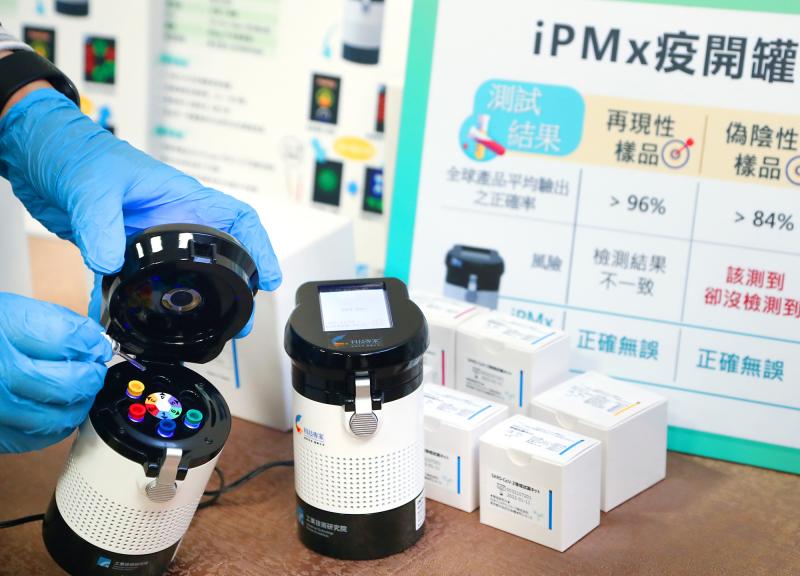The developer of the iPMx molecular rapid COVID-19 test system has received the first overseas order for the new product, from Japan, the Ministry of Economic Affairs said yesterday.
Industrial Technology Research Institute (ITRI, 工業技術研究院), which says that its iPMx system can accurately and efficiently detect SARS-CoV-2, has received an order for 100 test kits and 10,000 reagents from Japan Biotechno Pharma Co, the ministry said, adding that the order came as Japanese authorities, effective immediately, approved the product.
The authorities approved its use at small and medium-sized hospitals and clinics, as well as operating and emergency rooms at major hospitals, Department of Industrial Technology Director-General Chiou Chyou-huey (邱求慧) told a news conference in Taipei.

Photo: CNA
Technology developed for the test kit would be produced by BizLink Holding Inc (貿聯控股) in California as part of ITRI’s efforts to expand cooperation with foreign partners, Chiou said.
The iPMx system’s compact canister is 57 times lighter than traditional testing devices, weighing only 600g, ITRI said.
The system produces results within an hour, one-quarter of the time a polymerase chain reaction test takes, and is 95.8 percent accurate, it said.
Chiou said the system is like a “mobile laboratory” and is highly sought after in the Japanese testing market.
ITRI’s next step would be entering the markets in Southeast Asia, Europe and the US, he said, adding that the institute is in talks in such countries.
ITRI is developing a second-generation iPMx system, which would also be able to detect flu, Chiou said.

In Italy’s storied gold-making hubs, jewelers are reworking their designs to trim gold content as they race to blunt the effect of record prices and appeal to shoppers watching their budgets. Gold prices hit a record high on Thursday, surging near US$5,600 an ounce, more than double a year ago as geopolitical concerns and jitters over trade pushed investors toward the safe-haven asset. The rally is putting undue pressure on small artisans as they face mounting demands from customers, including international brands, to produce cheaper items, from signature pieces to wedding rings, according to interviews with four independent jewelers in Italy’s main

Macronix International Co (旺宏), the world’s biggest NOR flash memory supplier, yesterday said it would spend NT$22 billion (US$699.1 million) on capacity expansion this year to increase its production of mid-to-low-density memory chips as the world’s major memorychip suppliers are phasing out the market. The company said its planned capital expenditures are about 11 times higher than the NT$1.8 billion it spent on new facilities and equipment last year. A majority of this year’s outlay would be allocated to step up capacity of multi-level cell (MLC) NAND flash memory chips, which are used in embedded multimedia cards (eMMC), a managed

Japanese Prime Minister Sanae Takaichi has talked up the benefits of a weaker yen in a campaign speech, adopting a tone at odds with her finance ministry, which has refused to rule out any options to counter excessive foreign exchange volatility. Takaichi later softened her stance, saying she did not have a preference for the yen’s direction. “People say the weak yen is bad right now, but for export industries, it’s a major opportunity,” Takaichi said on Saturday at a rally for Liberal Democratic Party candidate Daishiro Yamagiwa in Kanagawa Prefecture ahead of a snap election on Sunday. “Whether it’s selling food or

In the wake of strong global demand for AI applications, Taiwan’s export-oriented economy accelerated with the composite index of economic indicators flashing the first “red” light in December for one year, indicating the economy is in booming mode, the National Development Council (NDC) said yesterday. Moreover, the index of leading indicators, which gauges the potential state of the economy over the next six months, also moved higher in December amid growing optimism over the outlook, the NDC said. In December, the index of economic indicators rose one point from a month earlier to 38, at the lower end of the “red” light.